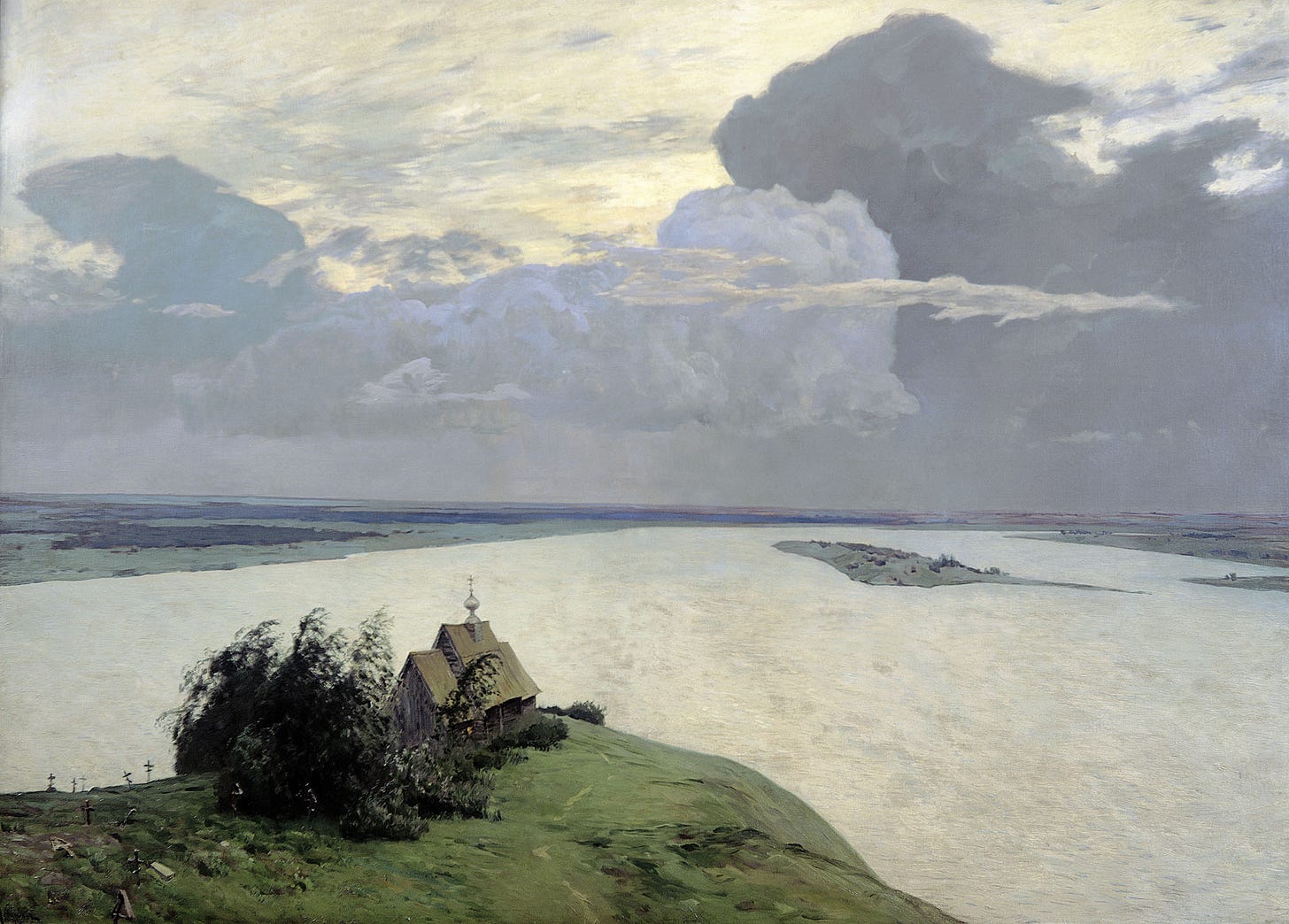I need a word.🙄Misery? Longing? Toska!
I want to give a name to that feeling of a pang of ache that evokes a longing for something you don't have because you don't know what you need.
I once read that our life is determined by the number of vocab list. Based on my experience, I tend to agree. It’s rather about our life is a play of the meaning of the words we only know.
Before you start reading, I ask you pay attention to every link I left within the text. Let’s make reading way captivating.

«Above the Eternal Peace», Isaac Levitan, 1894 (Udomlya lake)
There was a time when I saw the comments of the Brazilian www-users: saudade, sdds, etc. It seemed like something you miss because you’re far from it. And to some degree, I felt like “they are so proud of this word and its meaning, but it turned to be a superficial feeling” now. Later I came across a Franzen’s essay “I Just Called to Say I Love You” where he wrote:
<…> when I’m buying those socks at the Gap and the mom in line behind me shouts “I love you!” into her little phone, I am powerless not to feel that something is being performed; overperformed; publicly performed; defiantly inflicted.
And then he added:
Yes, a lot of domestic things get shouted in public which really aren’t intended for public consumption; yes, people get carried away. But the phrase “I love you” is too important and loaded, and its use as a sign-off too self-conscious, for me to believe I’m being made to hear it accidentally.
Russian people are quite interesting from this perspective. Have you ever seen how much we can be emotionally charged in public? Maybe that’s the reason why we don’t often use the word “ТОСКА” during a conversation. We try not to say our feelings on the streets. If you ask one: “how are you today?”, you may hear a very long story, but you might not understand the feelings they experienced.
Etymologically, it comes from the proto-Slavic root “tъska”. In the Old East Slavic language, “тъска” meant “tightness, grief, sadness, worry”. Also, you may hear such a verb as “таскать” that has an etymological connection meaning to carry a very heavy background, which makes people feel sad, wistful, and gloomy.
So in this newsletter, I want you to give a few minutes to study and then feel Russian “toska”.
My team is a set of books and a good playlist and of course your support. When you enroll in any language course, pay for it but do you feel satisfied with the result? We never know it beforehand. Here I share my understanding of the language and some phrases that will help you to grasp the logic of the Russian language. If you find my tips and ideas useful then…
There is one short and absolutely beautiful poem written by a silver poet (or second great poet after A.S. Pushkin) M.Yu. Lermontov. You may read it, listen to a man reciting, or singing it. The poem “The Cliff” is a record-holder among Russian composers. One of over 20, listen to the Rachmaninoff musical version. It’s not a melody fo a singer, but a symphony! Nobody did it before him.
And while you’re listening, follow the link to read a great short novel by Chekhov “Toska” (“Misery”) that was published in 1886. The first time Anton Chekhov came to St. Petersburg in December 1885 and was impressed by the hustle and bustle of Saint Petersburg. It’s a simple and really short novel where he accurately portrayed the inner world of a person experiencing тоску.
If Iona's heart were to burst and his misery to flow out, it would flood the whole world, it seems, but yet it is not seen.
Following the link, you’ll find an original text with two translations (in English and Spanish). In the document, you will find some tasks and some curious facts about the text “Toska”.
I chose this painting not by chance. There are many works on some interrelations between the works of Levitan and Chekhov. They both told about the rich inner world of a human. They both made stunning portraits of happiness and sadness. There is one article you should have a look to know more.
By the way, reading the poem, what do you think about that little gold cloud? What was it? Try to explain it in Russian (or, English? :) and share with me your ideas sending it to tweedledee6@mail.ru or you may leave a comment here.



